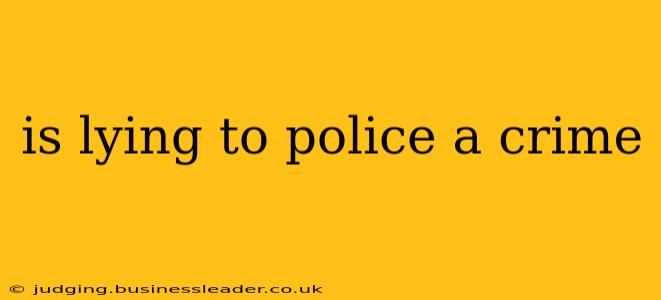Lying to the police is a complex issue, and whether or not it's a crime depends heavily on the context. While simply telling a white lie isn't usually illegal, providing false information that obstructs a police investigation or puts others at risk can lead to serious consequences. This guide will explore the legal nuances surrounding lying to law enforcement.
What Constitutes Lying to the Police?
The act of lying itself isn't inherently illegal. However, the intent and impact of the lie are crucial factors in determining whether it constitutes a crime. A minor inaccuracy, unintentional misstatement, or omission of irrelevant details is unlikely to be prosecuted. Conversely, deliberately providing false information that actively hinders an investigation or jeopardizes public safety can result in criminal charges.
What are the potential legal consequences of lying to police?
This depends heavily on the jurisdiction and the specifics of the case. Possible consequences include:
- Perjury: This is the act of lying under oath. If you're sworn in and provide false testimony in court or during a formal deposition related to a police investigation, you could face serious penalties, including hefty fines and imprisonment.
- Obstruction of Justice: Intentionally providing false information to hinder a criminal investigation is a serious offense. The penalties for obstruction of justice can be significant, potentially leading to felony charges and substantial jail time.
- False Reporting: Falsely reporting a crime is another serious offense. This includes making false allegations against someone or reporting a crime that never happened. The penalties can vary depending on the nature of the false report.
- Contempt of Court: Refusal to cooperate with a police investigation or provide truthful information when legally compelled to do so can result in contempt of court charges.
Is it always illegal to withhold information from the police?
No. You generally have the right to remain silent, and you're not obligated to provide incriminating evidence against yourself. However, intentionally withholding information that could be crucial to a police investigation, especially if you're a witness, could lead to legal repercussions.
Does the type of lie matter?
Yes. A minor, inconsequential lie is far less likely to result in criminal charges than a deliberate falsehood designed to protect someone from criminal prosecution or impede a major investigation. The prosecution will consider the severity of the lie and its potential impact on the investigation.
Are there exceptions to the rule?
There are situations where lying to the police might not be prosecuted. For example:
- Self-incrimination: The Fifth Amendment of the US Constitution protects individuals from being compelled to incriminate themselves. You are not required to answer questions that might lead to your own arrest.
- Minor inaccuracies: Small, unintentional mistakes are unlikely to result in legal consequences.
- Lack of intent: If there's no evidence that the lie was deliberate, charges are less likely.
What should you do if you accidentally lied to the police?
If you realize you've inadvertently misled the police, it's crucial to correct the information as soon as possible. Contact the investigating officer and explain the situation. While this doesn't guarantee you'll avoid any repercussions, it demonstrates your cooperation and willingness to set the record straight. Seeking legal counsel is highly recommended in such situations.
This information is for general understanding and does not constitute legal advice. It's crucial to consult with a legal professional if you have any questions or concerns about lying to the police or other legal matters. The specifics of each case depend on numerous factors, and legal ramifications can be severe. Therefore, exercising caution and seeking legal guidance when facing such situations is always recommended.
